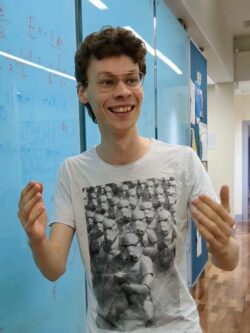LIFD Early Career Researcher Spotlight: Nils de Vries

Our monthly spotlight focuses on the work and lives of the researchers from the Leeds Institute for Fluid Dynamics
Thesis title:
Tidal dissipation due to the interaction of the elliptical and convection in giant planets and stars
School/Faculty:
School of Mathematics
Supervisors:
Dr. Adrian Barker and Prof. Rainer Hollerbach
Tell us a bit about yourself:
I am a third year PhD researcher in the school of Mathematics. Before I came to Leeds I completed a BSc in Physics at Utrecht University and a MSc in Planetary Science at UCL. During my MSc I fell in love with both exoplanet science and astrophysical fluid dynamics, so a PhD in astrophysical fluid dynamics studying giant exoplanets was a natural next step. I’ve enjoyed tutoring during both my BSc and MSc, and am glad to be able to continue teaching here.
Outside of work you can find me on the badminton court, in the climbing gym or wandering around on the moors.
What is your research about?
In my research I study the fluid flows in the interiors of Hot Jupiters, which are exoplanets similar in size and mass to Jupiter but located very close to their host stars in other solar systems. These Hot Jupiters experience very strong gravitational forces due the proximity to their host star, and as such the tides raised on these exoplanets are very large in amplitude. These large tides could then result in evolution of the spins and orbits of these giant planets themselves.
For this research I use a local box model, representing a small patch of the planet, to really study the fluid motions in detail. I particularly study the elliptical instability, which is a part of the tidal response that generates inertial waves in the fluid, and its interaction with the convective background present in these giant planets. I take both a fluid dynamical approach, i.e. studying the fluid motions and interactions, and an astrophysical approach, where I try to extrapolate my results to estimate the effect that this particular instability will have on tidal evolution.
What did you wish you knew before starting a PhD?
How many things you need to juggle at a time. A PhD is not just reading papers, doing your own research and possibly teaching. In reality it’s much more: you’re also juggling small admin tasks, preparing talks and posters, travelling to conferences, attending seminars all while maintaining a good social life. All of which are just as important for having a good PhD experience and good career progression as reading papers and doing research.
What are your plans for the future?
I have a little over a year left in my PhD, so I’m planning to do some more research and hopefully get another paper out before writing my thesis. Afterwards I hope to find an interesting Postdoc position which lets me continue researching astrophysical –or geophysical– fluid dynamics. There are many open questions, not just in the field of (exo)planets, but also in stars and accretion disks for example, that I’d be excited to work on.
